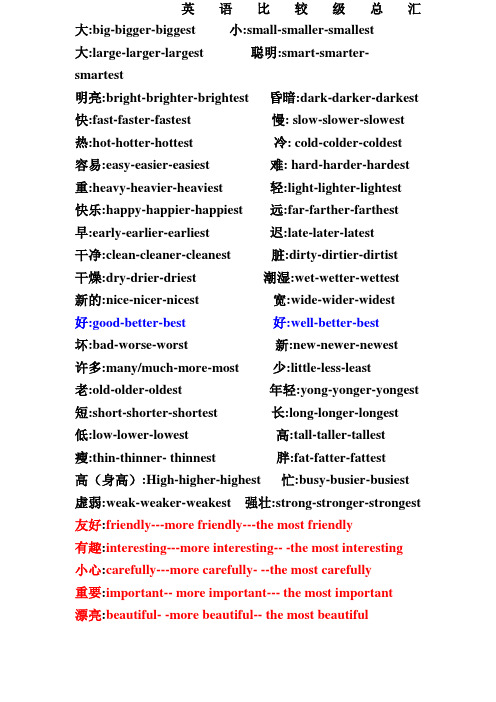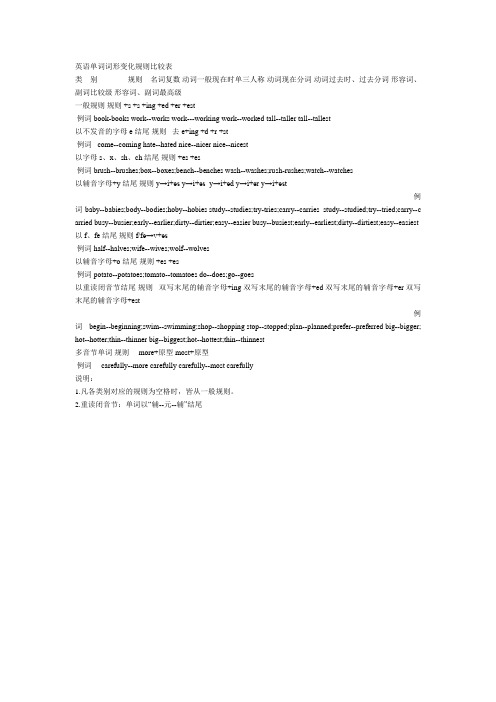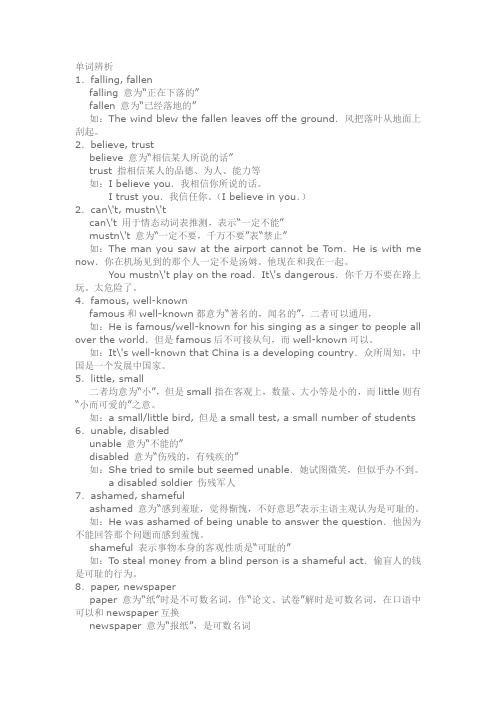英语单词比较
英语单词比较级

英语比较级总汇大:big-bigger-biggest 小:small-smaller-smallest大:large-larger-largest 聪明:smart-smarter- smartest明亮:bright-brighter-brightest 昏暗:dark-darker-darkest 快:fast-faster-fastest 慢: slow-slower-slowest 热:hot-hotter-hottest 冷: cold-colder-coldest容易:easy-easier-easiest 难: hard-harder-hardest 重:heavy-heavier-heaviest 轻:light-lighter-lightest快乐:happy-happier-happiest 远:far-farther-farthest 早:early-earlier-earliest 迟:late-later-latest干净:clean-cleaner-cleanest 脏:dirty-dirtier-dirtist干燥:dry-drier-driest 潮湿:wet-wetter-wettest新的:nice-nicer-nicest 宽:wide-wider-widest 好:good-better-best 好:well-better-best坏:bad-worse-worst 新:new-newer-newest许多:many/much-more-most 少:little-less-least老:old-older-oldest 年轻:yong-yonger-yongest 短:short-shorter-shortest 长:long-longer-longest 低:low-lower-lowest 高:tall-taller-tallest瘦:thin-thinner- thinnest 胖:fat-fatter-fattest高(身高):High-higher-highest 忙:busy-busier-busiest 虚弱:weak-weaker-weakest 强壮:strong-stronger-strongest 友好:friendly---more friendly---the most friendly有趣:interesting---more interesting-- -the most interesting小心:carefully---more carefully- --the most carefully重要:important-- more important--- the most important漂亮:beautiful- -more beautiful-- the most beautiful。
英语单词词形变化规则比较表

英语单词词形变化规则比较表类别规则名词复数动词一般现在时单三人称动词现在分词动词过去时、过去分词形容词、副词比较级形容词、副词最高级一般规则规则 +s +s +ing +ed +er +est例词 book-books work--works work---working work--worked tall--taller tall--tallest以不发音的字母e结尾规则去e+ing +d +r +st例词 come--coming hate--hated nice--nicer nice--nicest以字母s、x、sh、ch结尾规则 +es +es例词 brush--brushes;box--boxes;bench--benches wash--washes;rush-rushes;watch--watches以辅音字母+y结尾规则y→i+es y→i+es y→i+ed y→i+er y→i+est例词 baby--babies;body--bodies;hoby--hobies study--studies;try-tries;carry--carries study--studied;try--tried;carry--c arried busy--busier;early--earlier;dirty--dirtier;easy--easier busy--busiest;early--earliest;dirty--dirtiest;easy--easiest 以f、fe结尾规则f/fe→v+es例词 half--halves;wife--wives;wolf--wolves以辅音字母+o结尾规则 +es +es例词 potato--potatoes;tomato--tomatoes do--does;go--goes以重读闭音节结尾规则双写末尾的辅音字母+ing 双写末尾的辅音字母+ed 双写末尾的辅音字母+er 双写末尾的辅音字母+est例词 begin--beginning;swim--swimming;shop--shopping stop--stopped;plan--planned;prefer--preferred big--bigger; hot--hotter;thin--thinner big--biggest;hot--hottest;thin--thinnest多音节单词规则 more+原型 most+原型例词 carefully--more carefully carefully--most carefully说明:1.凡各类别对应的规则为空格时,皆从一般规则。
英语单词比较

英语单词比较1.neglect, ignore, omit “忽略,遗漏”neglect指对职责、义务或应做的事没有给予足够的注意,这种忘记可能是有意的,也可能是无意的。
Those who neglect their duties should be punished. 玩忽职守者应受惩罚。
Why do they always neglect the traffic regulation?ignore指疏忽、不顾、强调对某人或某物故意不理会,有时还带有固执地拒绝的意味。
When I saw Tom, I stopped to greet him, but he ignored me and walked on.The teacher ignored my difficult questions.omit指因专注或疏忽而忘记某事,这种失误可能是有意或无意的,该词还可指删除不利或不必要的东西。
She should not omit to visit the museum.The third part of the book may be omitted.The joys of travel having long ____C______the disabled,are opening up to virtually anyone who has the means.A. omittedB. missedC. neglectedD. Discarded2.principal, principleprincipal既可作形容词,又可用作名词。
作形容词用时,通常用来形容地位、作用等优于任何其它的物或人,常作“首要的”、“主要的”、“最重要的”解。
作名词用时,通常指技术学校、师范学校或音乐学校的“校长”,在美国可指中小学的“校长”,等于英国英语中的headmaster;也可指剧团里的“主要演员”,在法律方面,只犯罪团伙中有别于教唆犯或从犯的“主犯”,在财政方面指经营的活产生利息的“资本”、“本金”等。
英语单词辨析

单词辨析1.falling, fallenfalling 意为“正在下落的”fallen 意为“已经落地的”如:The wind blew the fallen leaves off the ground.风把落叶从地面上刮起。
2.believe, trustbelieve 意为“相信某人所说的话”trust 指相信某人的品德、为人、能力等如:I believe you.我相信你所说的话。
I trust you.我信任你。
(I believe in you.)2.can\'t, mustn\'tcan\'t 用于情态动词表推测,表示“一定不能”mustn\'t 意为“一定不要,千万不要”表“禁止”如:The man you saw at the airport cannot be T om.He is with me now.你在机场见到的那个人一定不是汤姆。
他现在和我在一起。
You mustn\'t play on the road.It\'s dangerous.你千万不要在路上玩。
太危险了。
4.famous, well-knownfamous和well-known都意为“著名的,闻名的”,二者可以通用,如:He is famous/well-known for his singing as a singer to people all over the world.但是famous后不可接从句,而well-known可以。
如:It\'s well-known that China is a developing country.众所周知,中国是一个发展中国家。
5.little, small二者均意为“小”,但是small指在客观上,数量、大小等是小的,而little则有“小而可爱的”之意。
如:a small/little bird, 但是a small test, a small number of students 6.unable, disabledunable 意为“不能的”disabled 意为“伤残的,有残疾的”如:She tried to smile but seemed unable.她试图微笑,但似乎办不到。
英语单词比较级

英语比较级总汇大:big-bigger-biggest 小:small-smaller-smallest 大:large-larger-largest 聪明:smart-smarter- smartest明亮:bright-brighter-brightest 昏暗:dark-darker-darkest快:fast-faster-fastest 慢: slow-slower-slowest热:hot-hotter-hottest 冷: cold-colder-coldest容易:easy-easier-easiest 难: hard-harder-hardest重:heavy-heavier-heaviest 轻:light-lighter-lightest快乐:happy-happier-happiest 远:far-farther-farthest早:early-earlier-earliest 迟:late-later-latest干净:clean-cleaner-cleanest 脏:dirty-dirtier-dirtist干燥:dry-drier-driest 潮湿:wet-wetter-wettest新的:nice-nicer-nicest 宽:wide-wider-widest好:good-better-best 好:well-better-best 坏:bad-worse-worst 新:new-newer-newest许多:many/much-more-most 少:little-less-least老:old-older-oldest 年轻:yong-yonger-yongest短:short-shorter-shortest 长:long-longer-longest低:low-lower-lowest 高:tall-taller-tallest 瘦:thin-thinner- thinnest 胖:fat-fatter-fattest 高(身高):High-higher-highest 忙:busy-busier-busiest虚弱:weak-weaker-weakest 强壮:strong-stronger-strongest友好:friendly---more friendly---the most friendly有趣:interesting---more interesting-- -the most interesting小心:carefully---more carefully- --the most carefully 重要:important-- more important--- the most important漂亮:beautiful- -more beautiful-- the most beautiful。
英语最容易混淆单词比较记忆

英语最容易混淆单词比较记忆一、accommodate, afford, furnish这一组动词都有“提供”的意思。
accommodate v.提供住宿、房间;适应,迎合,迁就。
This hotel can accommodate up to 500 guests. 这家饭店可供500位来宾住宿。
The company accommodated the customer's wish and sent the delivery overnight.公司满足了顾客的愿望,连夜将货物发了出去。
afford v.负担,支付;当“提供”讲时,多用于指抽象事物的提供?对吗。
We can't afford that expensive sports car. 我们买不起那辆昂贵的跑车。
The tall building affords a beautiful view of the ocean. 从这幢高楼上可以看到大海的美丽景致。
Furnish v.指提供生活或某种用途所需要的东西。
Reading furnishes the mind only with materials of knowledge, it is thinking that makes what we read ours.阅读虽然为我们的思想提供了各种知识,然而只有思考才能将我们读到的内容变成自己的东西。
一、, adhere, conform, comply, obey这四个研究生入学考试中的高频考词都有“遵守”的意思,但是它们的搭配不同。
Abide v.后接by表示“遵守,同意”。
I will abide by the director' decision.我将遵从主任的决定。
adhere v.后接to表示“遵守”。
(当然adhere一词的其它意思如“坚持;粘附”也经常被考到。
)Car drivers must adhere to the rules of driving.汽车司机必须遵守驾驶规则。
英语单词中的比较级

没有比较级、最高级的形容词和副词英语中,有些形容词和副词没有比较等级,这主要是由于本身词义的缘故,在语义上不存在差别,这类词可称为不可分级形容词或副词。
主要有下列几类:1、本身就有比较级含义的词:senior年长的、较高的,junior年少的、较低的,prior在先的,anterior前面的,inferior次于、下等的,superior优于、上等的,posterior以后的,major主要的,minor次要的、较小的。
在使用这些词时无须加more,也不能和than连用,而要用介词to引出比较对象(这种表示法也称为拉丁比较级)。
例如:Thissocial system is super or than that system. 这种社会制度比那种优越。
He issenior to me by several years . 他比我大几岁。
Hismethod of doing reserach work is hardly appreciated ;he feels inferior toothers. 他做研究的方法没人欣赏;他感到比别人矮了一截。
2、表示状态或情况的词:afriad害怕的,asleep睡着的,alive活着的,alike相象的,awake醒着的,alone单独的,aware意识到的,ablaze着火的,adrift漂流的,afire燃烧着的,astray迷途,aghast惊呆的,ashamed羞耻的,alight照亮,astire 引动起来,afoot活动着的,ashore在岸上的,agape目瞪口呆,awerse不乐意的,afloat浮着。
3、表示形状的词;round圆形的,circular圆形的,oval椭圆形的,square方形的,oblong长方形的,angular角形的,level水平的,horizontal水平的。
4、表示物质特征的词;atomic原子的,solar太阳的,physical物理的,organic有机的,economic 经济的,sonic声音的,scientific科学的,wooden木制的,earthen泥土的,golden黄金般的,woolen羊毛的,bronze青铜的,silver银制的。
英语单词比较级

英语比较级总汇大:big-bigger-biggest 小:small-smaller-smallest 大:large-larger-largest 聪明:smart-smarter- smartest 明亮:bright-brighter-brightest 昏暗:dark-darker-darkest 快:fast-faster-fastest 慢: slow-slower-slowest 热:hot-hotter-hottest 冷: cold-colder-coldest容易:easy-easier-easiest 难: hard-harder-hardest 重:heavy-heavier-heaviest 轻:light-lighter-lightest快乐:happy-happier-happiest 远:far-farther-farthest 早:early-earlier-earliest 迟:late-later-latest干净:clean-cleaner-cleanest 脏:dirty-dirtier-dirtist干燥:dry-drier-driest 潮湿:wet-wetter-wettest新的:nice-nicer-nicest 宽:wide-wider-widest 好:good-better-best 好:well-better-best坏:bad-worse-worst 新:new-newer-newest许多:many/much-more-most 少:little-less-least老:old-older-oldest 年轻:yong-yonger-yongest 短:short-shorter-shortest 长:long-longer-longest 低:low-lower-lowest 高:tall-taller-tallest瘦:thin-thinner- thinnest 胖:fat-fatter-fattest高(身高):High-higher-highest 忙:busy-busier-busiest 虚弱:weak-weaker-weakest 强壮:strong-stronger-strongest 友好:friendly---more friendly---the most friendly有趣:interesting---more interesting-- -the most interesting小心:carefully---more carefully- --the most carefully重要:important-- more important--- the most important漂亮:beautiful- -more beautiful-- the most beautiful。
- 1、下载文档前请自行甄别文档内容的完整性,平台不提供额外的编辑、内容补充、找答案等附加服务。
- 2、"仅部分预览"的文档,不可在线预览部分如存在完整性等问题,可反馈申请退款(可完整预览的文档不适用该条件!)。
- 3、如文档侵犯您的权益,请联系客服反馈,我们会尽快为您处理(人工客服工作时间:9:00-18:30)。
1.neglect, ignore, omit “忽略,遗漏”neglect指对职责、义务或应做的事没有给予足够的注意,这种忘记可能是有意的,也可能是无意的。
Those who neglect their duties should be punished. 玩忽职守者应受惩罚。
Why do they always neglect the traffic regulation?ignore指疏忽、不顾、强调对某人或某物故意不理会,有时还带有固执地拒绝的意味。
When I saw Tom, I stopped to greet him, but he ignored me and walked on.The teacher ignored my difficult questions.omit指因专注或疏忽而忘记某事,这种失误可能是有意或无意的,该词还可指删除不利或不必要的东西。
She should not omit to visit the museum.The third part of the book may be omitted.The joys of travel having long ____C______the disabled,are opening up to virtually anyone who has the means.A. omittedB. missedC. neglectedD. Discarded2.principal, principleprincipal既可作形容词,又可用作名词。
作形容词用时,通常用来形容地位、作用等优于任何其它的物或人,常作“首要的”、“主要的”、“最重要的”解。
作名词用时,通常指技术学校、师范学校或音乐学校的“校长”,在美国可指中小学的“校长”,等于英国英语中的headmaster;也可指剧团里的“主要演员”,在法律方面,只犯罪团伙中有别于教唆犯或从犯的“主犯”,在财政方面指经营的活产生利息的“资本”、“本金”等。
principle属名词,通常指做某事的“原则”或某种学科的“原理”。
3.continual, continuous, constant这三个形容词都有“连续的”,“不断的”的意思,但也有所区别。
continual “连续的,继续的,老是“,指在一个较长时间或空间内有间歇的重复。
通常修饰一个令人不快的东西。
continuous “连续的,不断的”,指某事在或长或短的时间或空间内连续发生,毫无间歇,但有开始和结束。
constant “不断的;经常的”,含有“永恒不变”的意思。
1. ________ smoking does harm to health.2. She was tired of _________ trips to the grocery, school and office.3. The noise of _________________ hammering disturbed me.4. The brain needs a ____________ supply of blood.5.There was ________________ rain for weeks.6. It is important in scientific experiments that all the conditions should be ____________.7. He was _________ in his efforts to improve his skills.4.emerge,appear&loom这三个词都有“出现”之意appear指人物的显现,几乎不含背景或来源,只表示进人视野之内。
He appeared before the audience.他出现在观众面前。
loom指从雾中或从不清晰的背景中显露出来,尤指以庞大或使人产生恐惧的形态突然出现,其后常接up。
A figure loomed up out of the mist.迷雾中突然出现了一个身影。
emerge表示从包围中进入开阔空间,由此比喻初露锋芒。
The moon emerged from behind the clouds.月亮自云后现出。
Richard was waiting outside the door as the teacher emerged.老师出现的时候理查德正在门外等着。
After a long hunt of him,we saw him emerge from the crowd.我们找了他半天,才见他出现在人群中5.worth,worthwhile,worthy这三个词都有“值得”的意思,但用法有区别。
worth可作形容词或名词。
一般可用well,hardly修饰,其后接名词或动名词作宾语。
接动名词时,以主动形式表被动意义。
整个结构可用作表语或后置定语。
worthwhile中的while是名词(仅用单数形式),原来的意思等于time,但现在多作为一般的而且意思含糊得多的词使用。
有时while前还可有形容词性的物主代词修饰,其后可接动名词或不定式短语,其动名词和不定式短语不是while的宾语,而是句中的真正主语,为形式主语。
worthy是形容词,用作表语或后置定语时,后常接of加名词或动名词的被动形式,也可接动词不定式的被动形式。
有时,该词也可接主动形式的不定式,这时作“完全能够”解,如:In peculiar, a king must set a good example to his subjects. Only then would he be worthy to rule. 君主特别要身体力行做其臣民的表率,只有这样,君主才能君临天下。
它还可作前置定语,表示“可敬的”的意思,主要形容在品行方面令人尊敬的人。
注意:以it开始的句子中,worth+V-ing和worthwhile+V-ing的区别,一般来说,当it代表某说话人心目中的某个明确的事物时,只能用worth+V-ing的形式。
如:It is not worth saving. 这件东西不值得保存。
当it无具体含义,仅用作形式主语,代表句中后面动名词或不定式部分时,只能用worth while+V-ing的形式。
如:It is not worth while saving. 存放是不值得的。
6.remote,distant&far “远”distant 意为“远的;远隔的”,比far庄严些,特指科学用语,含有距离大小的含义,可用于空间也可用于时间,更常被用在比喻的意味上。
e.g.:He is a distant cousin of mine. 他是我的远房表弟。
far意为“远的”,是一个比较纯的用语,它不仅指实际的距离,也用在比喻意义上,指遥远的前途、未来、过去等等。
此词虽有像a far country,the far future等用法,但通常被用来作表语。
此词用作副词时,常与distant连用。
e.g.:The hill is very far distant. 那座山非常遥远。
remote 意为“遥远的”,用以指场所,亦可用以指时间,还含有“孤独的、不易达到的、难以出名的”等意味,如遥远的边疆、国家、大海、古代、未来、亲戚等。
e.g.: (1)They live in a mountain remote from any town or village.他们居住在远离任何城镇和村庄的大山里。
(2)Some of your statements are rather remote from the subject we are discussing.你有一些话与我们所谈论的问题关系不甚密切。
(3)The chance of finding him were so remote that they gave up the search.找到他的机会如此渺茫,以至于他们放弃了搜索7.faithful,loyal&truthful三个同都可作“忠实的,忠诚的”讲faithful adj. 多指忠诚于相关联的人或事业,也指坚定不移地守信义,后常接sb.,doctrine,promise 等,带有“始终不渝”的意味。
He is faithful to his promise.他信守诺言。
He was faithful from first to last.他始终是忠实的。
loyal adj. 指忠实履行自己的誓言或指一贯忠实于领导、国家、单位和道德准则,含有坚定不移的意味。
We are loyal to our country. 我们忠于自己的祖国。
She is a loyal friend. 她是位忠实的朋友。
truthful adj. 在强调对个人情感上的忠诚程度时,语气比loyal和faithful强烈,主要强调诚实、不撒谎。
A truthful man is one who habitually tells the truth.一个诚实的人是习惯说实话的。
He gave me a truthful answer.他给我一个坦诚的回答。
pose, consist of, comprise, constitute (组成,构成)1)compose常用于被动语态。
Be composed of 表示“由…构成”,用于主动语态时,一般包含“融合为一”的意思,主语是复合名词或集合名词。
Concrete is composed of cement, sand and gravel mixed with water.England, Scotland and Wales composes the island of Great Britain.2) consist of “由…构成”,强调结果是一个统一整体。
New York City consists of five boroughs.3) comprise “由…构成”,也可表示“构成”。
The committee comprises men of widely different views.Fifty states comprise the United States.4) constitute 的主语可以是复数名词,也可以是单数名词,所“构成”的事物在属性和特征上,亦或在组织上与组成成分一致。
Seven days constitutes a week.9.glorious,splendid,brilliant&superb这四个词都有“辉煌的、壮丽的”之意splendid指人才华出众,成就辉煌;指物体外观雄伟美丽或光辉灿烂。
